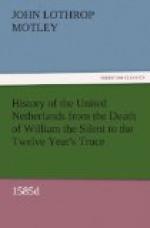Alexander, who knew his master to be inexorable upon these three points, was courteous but peremptory in his statements. He recommended that the rebels should take into consideration their own declining strength, the inexhaustible resources of the King, the impossibility of obtaining succour from France, and the perplexing dilatoriness of England, rather than waste their time in idle expectations of a change in the Spanish policy. He also intimated, obliquely but very plainly, to Sainte Aldegonde, that his own fortune would be made, and that he had everything to hope from his Majesty’s bounty, if he were now willing to make himself useful in carrying into effect the royal plans.
The Prince urged these views with so much eloquence, that he seemed, in his own words, to have been directly inspired by the Lord for this special occasion! Sainte Aldegonde, too, was signally impressed by Alexander’s language, and thoroughly fascinated-magnetized, as it were —by his character. He subsequently declared, that he had often conversed familiarly with many eloquent personages, but that he had never known a man more powerful or persuasive than the Prince of Parma. He could honestly say of him—as Hasdrubal had said of Scipio—that Farnese was even more admirable when seen face to face, than he had seemed when one only heard of his glorious achievements.
“The burgomaster and three deputies,” wrote Parma to Philip, “were here until the 12th July. We discussed (30th July, 1585) the points and form of a capitulation, and they have gone back thoroughly satisfied. Sainte Aldegonde especially was much pleased with the long interview which he had with me, alone, and which lasted more than three hours. I told him, as well as my weakness and suffering from the tertian fever permitted, all that God inspired me to say on our behalf.”
Nevertheless, if Sainte Aldegonde and his colleagues went away thoroughly satisfied, they had reason, soon after their return, to become thoroughly dejected. The magistrates and burghers would not listen to a proposition to abandon the three points, however strongly urged to do so by arguments drawn from the necessity of the situation, and by representations of Parma’s benignity. As for the burgomaster, he became the target for calumny, so soon as his three hours’ private interview became known; and the citizens loudly declared that his head ought to be cut off, and sent in a bag, as a present, to Philip, in order that the traitor might meet the sovereign with whom he sought a reconciliation, face to face, as soon as possible.
The deputies, immediately after their return, made their report to the magistrates, as likewise to the colonels and captains, and to the deans of guilds. Next day, although it was Sunday, there was a session of the broad council, and Sainte Aldegonde made a long address, in which—as he stated in a letter to Richardot—he related everything that had passed in his private conversation with Alexander. An answer was promised to Parma on the following Tuesday, but the burgomaster spoke very discouragingly as to the probability of an accord.




